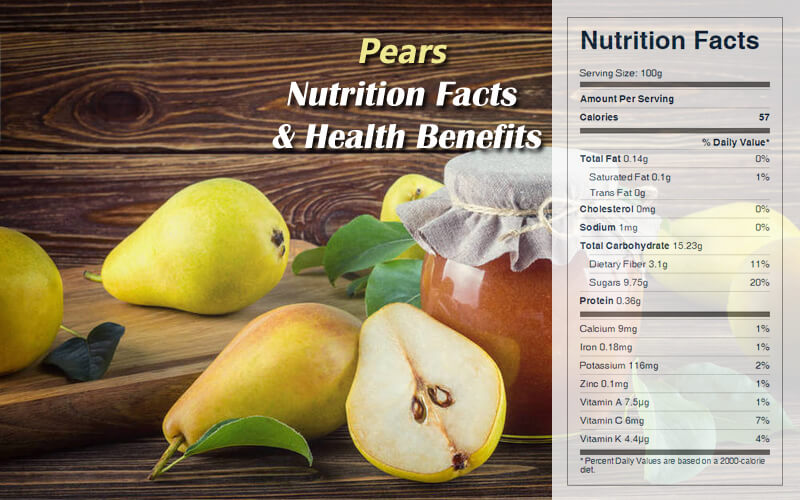Raw Pear Nutrition Facts & Health Benefits
There are about 3,000 varieties of pears grown worldwide.Pears are a good source of pectin, which helps bowel function and increases the amount of cholesterol eliminated by the body. Here are the nutrition facts and health benefits of pears.

Raw pear is 84% water, 15% carbohydrates and contains negligible protein and fat. One medium pear provides 103 calories, 27.5 g carbohydrate, 0.68 g protein, 0.21 g fat, 5.5 g dietary fiber, 41 IU vitamin A, 7.5 mg vitamin C, 0.28 mg niacin, 8 mcg vitamin K, 16 mg calcium, 12 mg magnesium, 20 mg phosphorus, and 212 mg potassium.
Raw Pears Nutrition Facts Label
Health Benefits of Pears
Pears are rich in vitamins B2, C, E, and K, as well as copper and potassium, and they are a great source of fiber. Pears are the least acidic of common fruits, so they are recommended for both babies and adults with gastric reflux or a tendency to heartburn.
Pears are helpful for digestion and convalescence and are a source of easily accessible good calories. They contain no fat and virtually no sodium, but they do contain fruit sugar, which is easily converted into instantly usable energy.
Red-hued pears, such as Red Anjou and Red Bartlett, have more antioxidant anthocyanins than the green, yellow, and brown varieties.
Pears are one of the foods least likely to cause any type of allergic reaction, so they’re ideal for babies and used in exclusion diets where food allergies or intolerances are suspected.
An Australian project on the influence of foods on asthma found that pears and apples seemed to protect the young adults studied both from asthma attacks and from developing asthma. And although any food may cause an allergy in a person sensitive to it, pears are so rarely allergenic that they are included in the allergen-restricted diets used to determine and control food allergies.
However, fresh pears do contain a sugar-based alcohol called sorbitol. While this sugar-free sweetener is tooth-friendly, in large amounts it may cause diarrhea in a small number of susceptible people.
Storage
Fully ripe pears are very perishable. They are optimally stored refrigerated, uncovered in a single layer, where they have a shelf life of 2 to 3 days.
Pears may be stored at room temperature until ripe. If pears are placed next to bananas in a fruit bowl, the ethylene emitted by the banana causes the pears to ripen.
The pears will have more antioxidant value if you eat them when fully ripe.